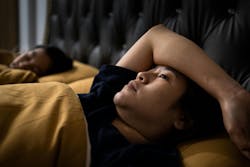Mild Covid-19 infections make insomnia more likely, especially in people with anxiety or depression
Although most patients diagnosed with Covid-19 will quickly recover, some people experience symptoms that linger well after they start testing negative again — including insomnia. Scientists already knew that insomnia was common in patients who had to be hospitalized, but a team of scientists led by Dr Huong T. X. Hoang of Phenikaa University, Vietnam began to wonder if mild infections might also affect sleep quality.
Using Vietnam’s official network of Covid-19 survivors, the scientists recruited 1,056 people over the age of 18 who had been diagnosed with Covid-19 but not hospitalized in the last six months, and who reported no history of insomnia or psychiatric conditions. They sent out a survey to these people for completion between June and September 2022.
The survey asked about sociodemographic characteristics like age, sex, and chronic conditions, and the duration and severity of patients’ Covid-19 infection. It also measured symptoms of anxiety, stress, and depression experienced by patients. To investigate levels of insomnia, patients were asked to compare how well they slept, how long they slept, and how easy it was to fall asleep in the last two weeks, compared to before contracting Covid-19.
76.1% of participants reported experiencing insomnia: 22.8% of these people reported severe insomnia. Half the participants said they woke more often in the night, while a third said that they found it harder to fall asleep, slept worse, and slept for less time. The severity of their initial infection didn’t seem to correlate with the severity of the insomnia they experienced. Although asymptomatic Covid-19 patients scored lower on the insomnia index, the difference was not statistically significant.
Two groups of people did have statistically significant higher rates of insomnia. These were people who had a pre-existing chronic condition, and people who scored highly for depressive or anxious symptoms. Both groups developed insomnia at a higher rate than their peers. When the scientists looked at those patients who reported insomnia, their depression and anxiety scores were higher than the average scores of the entire sample.
However, these illnesses are not completely independent of each other. Insomnia can worsen mental and physical health, as well as being driven by poorer mental and physical health.
The scientists pointed out that the rate of insomnia reported by patients is not only much higher than the rate among the general population, but higher than that reported for hospitalized Covid-19 patients. This could be partly because they focused on recently recovered patients who may have lingering symptoms. Recently recovered patients may also be more stressed and sensitive to changes in their physical health, leading them to perceive their sleep as worse.





